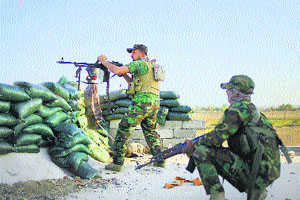
G Parthasarathy
During its first year in office, the Modi government has focused primary attention on its eastern, South Asian and Indian Ocean neighbourhood to build a stable balance of power across India's land and maritime frontiers. But new challenges, alliances and groupings are emerging in the predominantly Islamic region, extending from the Persian Gulf to the shores of the Mediterranean, which India cannot afford to ignore. This is a region where six million Indians reside, remitting some $40 billion annually, from where we get over 75 per cent of our supplies of oil and natural gas. Three major developments require careful attention. These are the emergence of the ISIS, the growing Persian-Arab and sectarian Shia-Sunni tensions and the possibility of a negotiated end to the Iranian nuclear impasse. All this is occurring amidst the fall in global oil and gas prices, which is imposing strains on the economies of countries in the Persian Gulf.
The entire polity of what is known as the Greater Middle East (extending from Pakistan to Turkey) has been destabilised by America-led subversion and invasions in Iraq, Syria and Libya, to oust secular, but authoritarian governments without any viable alternatives in sight. In Syria, America-supported destabilisation efforts have led to millions fleeing their homes and the emergence of diverse groups embroiled in a seemingly endless civil war. The invasion of Iraq has led to Shia-Sunni bloodletting that has spread across the entire region. Libya has been fragmented by similar intervention and has emerged as yet another centre of Shia-Sunni conflict. The intervention in Syria has led to the emergence of the Islamic Sate of Levant (ISIS). The ISIS now controls large parts of Syria and northern Iraq and has made inroads in Libya, while establishing links with religious extremists in Nigeria, Somalia and elsewhere.
The world has seldom, if ever, seen a group as fanatical, revivalist and ruthless as the ISIS, which has drawn thousands of armed cadres, not just from Arab and Islamic countries, but from across Europe and America. Its practices include arbitrary killing of non-Muslims and Shias. It forcibly takes non-Muslim women as slaves, extorts payment of Jazia tax from non-Muslims and practises beheading and crucifixion. The only other recent case of similar behaviour was by the Afghan Taliban, which led to the persecution of Shias and the requirement of Hindus to display their identity, sporting yellow scarves/arm band. Another barbaric trait that the ISIS shares with the Taliban is the destruction of ancient shrines, artefacts, statues and art. If the Taliban vandalised and dynamited the historic Bamiyan Buddha statues, the ISIS has destroyed or sold the priceless ancient civilizational treasures of Nimrud, Tikrit and Mosul.
The escalating tensions in the “Greater Middle East” have led to a Sunni Arab Alliance led by Saudi Arabia and Egypt, facing off a Shia Iran-led grouping, which includes Iraq and Syria. We also have a strange situation of Iran and the US making common cause, to assist Iraqi security forces to drive out the ISIS from the Sunni majority Tikrit, Mosul and across the Anbar Province. The US provides air power, while Iranian Revolutionary Guards train, arm, equip and fight alongside Iraqi Shia militia. Yet another interesting meeting of minds in this scenario is between Israel and the Sunni Arab leadership of countries like Saudi Arabia and Egypt. While Mr. Netanyahu has addressed the US Congress in Washington to voice his opposition to an agreement between the US, Russia, China, the UK, France and Germany on the one hand and Iran on the other, to end sanctions against Iran, the Sunni Arab countries have also launched a diplomatic offensive to get the US to scuttle the proposed deal.
Obviously chary of an Iranian “Shia Bomb,” Saudi Arabia and its Arab Gulf partners held discussions with US Secretary of State John Kerry on March 4 and voiced their reservations about a prospective US-led Iranian nuclear deal. The Saudis simultaneously fear not only an American-Iranian rapprochement, but also the prospects of the growing ISIS presence along their borders and in the Arab world. They know that the US is no longer dependent on them for oil supplies and, in fact, now has oil and gas reserves to meet the current levels of demand for 85 years.
It is in this background that Pakistan's Prime Minister Nawaz Sharif was personally received on arrival at Riyadh airport on March 3 by King Salman bin Abdul Aziz, Crown Prince Mukri and the entire Saudi Cabinet. This was a rare honour for a Head of Government, especially from a bankrupt country that has long survived on Saudi and American doles.
The Pak-Saudi nuclear links go back to the 1990s when Dr A.Q. Khan paid visits to Saudi Arabia, following a visit to the Kahuta nuclear and missile facilities by the then Saudi Defence Minister Prince Salman. Interestingly, Pakistan tested, for the first time, a nuclear capable missile Shaheen 3, with a range of 2,750 km capable of striking targets beyond India, just after the Sharif visit to Riyadh. This missile could be an asset to target Iran from Saudi Arabia. The already complicated situation in the Greater Middle East could become even tenser, if Pakistan agrees to send troops to guard Saudi Frontiers, or provides the desert kingdom a "Sunni Nuclear Shield," to counter Iran. Given tensions on its borders with India, Afghanistan and Iran, it remains to be seen how Pakistan responds to Saudi requests for military assistance- conventional and nuclear.
New Delhi has just gone through a significant effort in building viable security architecture with neighbouring Indian Ocean Island States. There is now need for careful consideration and thought on the impact of recent developments across the Islamic world on India's security and the welfare of its nationals in the Arab Gulf States.



























